Introduction
Summary
The field of political communication – where politicians, public relations professionals, journalists, and the public intersect and interact – has always been a highly contested one fuelled by suspicion and mutual dependence. To reach the public, politicians need the media, while to inform and serve the public, journalists need access to politicians. For most of the time what emerges is a relatively stable relationship of mutual dependence with the boundaries policed by public relations professionals. Access is negotiated, information is supplied, politicians fly kites about potential initiatives, and journalists analyse the possible outcomes.
However, every so often, in times of political crisis or upheaval, this closely regulated relationship gives way to a near free-for-all. Politicians, press secretaries, and sometimes even journalists, become fair game in the battle for public accountability and support. The determination of public relations professions to avoid this breakdown and keep the relationship based on mutual dependence has become a central component of modern statecraft and systems of governance. The need to keep politicians and journalists ‘on message’ and use the media to inform, shape and manage public discourse has become central to the workings of government, opposition and interest groups. On the other hand, the packaging of politics has potentially troublesome implications for the democratic process. What does it mean for journalists tasked with providing independent assessments of politicians and policies? Have politics and political communication become characterised by style over substance? With a near-instant news cycle, new communication technologies and constant opinion polling, where does information end and misinformation begin? And with millions of euros being spent annually on advisors, spin-doctors and lobbyists, is the system transparent or open to manipulation?
This book presents an overview of political communication in the Republic of Ireland from a multiplicity of academic and practitioner perspectives. It does not advance the view that political communication in the republic has become dominated by politicians, public relations practitioners or journalists – more so it seeks to explore critically the sometimes open, sometimes fraught relationship dynamics that are at the heart of political communication. It appears at a time of increased concern about the way in which politics and journalism interact within the public sphere. Against the backdrop of the rise and fall of a property-fuelled economic boom and a bailout by the EU and IMF, politics and political communication have come under sustained scrutiny by a concerned public.
- Type
- Chapter
- Information
- Publisher: Liverpool University PressPrint publication year: 2014



